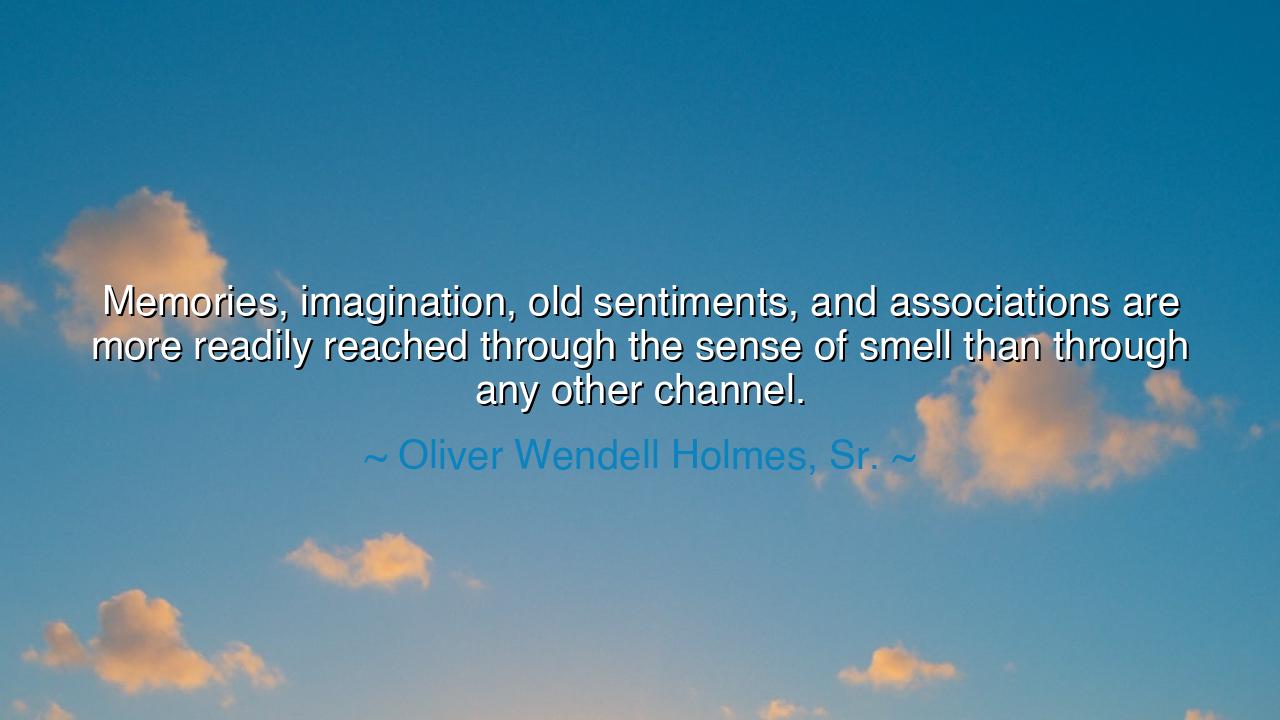
Memories, imagination, old sentiments, and associations are more
Memories, imagination, old sentiments, and associations are more readily reached through the sense of smell than through any other channel.






“Memories, imagination, old sentiments, and associations are more readily reached through the sense of smell than through any other channel.” Thus wrote Oliver Wendell Holmes, Sr., physician, poet, and philosopher — a man whose mind bridged both the sciences of the body and the mysteries of the soul. In these words, he reveals one of nature’s quietest yet most profound truths: that smell, more than sight or sound, is the secret key to the treasure house of memory. Long before the study of the brain or the science of emotion, Holmes knew — as the ancients knew — that the senses are the gateways of the spirit, and that among them, the sense of smell reigns as the keeper of the past.
What Holmes declares here is no mere observation of the senses, but a meditation on the human condition. For smell, unlike sight or hearing, travels not through reason but through remembrance. It slips past the walls of thought and enters directly into the heart, awakening memories, imagination, and sentiment long buried beneath the dust of time. A familiar fragrance — a whiff of pine, a trace of rain on dry earth, a faint perfume — can conjure an entire world in an instant. The smell of bread baking may recall a mother’s kitchen; the scent of tobacco may summon a father’s study; the fragrance of lilac may resurrect a spring long vanished. Thus, smell becomes not just a sense, but a time machine of the soul, binding past and present in one breath.
Even the ancients, who lived closer to nature than we, understood this sacred power. In the temples of Egypt and Greece, incense rose like prayer, for they believed that the gods themselves could be moved through fragrance. The Hebrews burned sweet spices in their offerings, and in the East, sandalwood and myrrh were thought to purify not only the air, but the soul. Such rituals were not superstition, but wisdom — the recognition that scent speaks to the deepest part of human consciousness. For when we breathe, we do not merely inhale air; we draw in the world itself, and with it, the memories and emotions that define our being.
Modern science has since confirmed what Holmes knew by intuition: that the pathways of smell lead directly to the brain’s centers of emotion and memory. But the truth is greater than the science — it is spiritual. To smell is to remember not with the mind, but with the heart. It is to awaken that part of the self untouched by age or intellect, where childhood still lives and loved ones never die. The poet Marcel Proust would later capture this mystery when he described the taste and scent of a madeleine that carried him, in a flood of memory, back to the innocence of his youth. Such moments remind us that memory is not stored only in thought, but in the senses — in the body, in the breath, in the very act of being alive.
Consider how even a soldier, long after the battles are done, may be undone by the smell of gunpowder or rain-soaked leather. Or how a widow, catching the faint scent of her late husband’s cologne on an old scarf, may find herself once more in his embrace, though years have passed. These are not hallucinations but holy visitations — moments when smell calls forth the imagination to rebuild what time has taken away. Through this union of sense and spirit, we come to see that the human heart is not a grave of memories, but a living garden, watered by scent and sentiment, ever blooming anew.
And so Oliver Wendell Holmes, with his physician’s precision and poet’s soul, teaches us something essential about life: that to truly remember, we must breathe deeply. We must learn again to notice — to inhale the fragrance of the world around us with reverence. For in each breath lies the potential to reconnect with all that we have been, all that we have loved. When the modern world numbs the senses with speed and noise, the act of stopping to smell — the earth after rain, a rose in the sunlight, the pages of an old book — becomes not indulgence, but salvation.
The lesson, then, is simple yet eternal: cherish your senses, for through them flows the river of your soul. Let smell be your teacher — a reminder that life is not lived in thoughts alone, but in the rich and fragrant tapestry of experience. When you next encounter a scent that stirs something deep within you, pause and listen. What memory stirs? What emotion wakes? What story does it tell? For in that moment, the veil of time lifts, and you are, once more, wholly alive — surrounded by the living echoes of your own imagination and the eternal fragrance of your past.
Thus, as Holmes teaches, the sense of smell is not the lowest of senses, but the most ancient and divine. It is the breath of memory, the perfume of life’s passage, the invisible thread that binds the heart to its history. And to those who would live wisely and deeply, it whispers this truth: remember to breathe — for in breathing, you remember everything.






AAdministratorAdministrator
Welcome, honored guests. Please leave a comment, we will respond soon